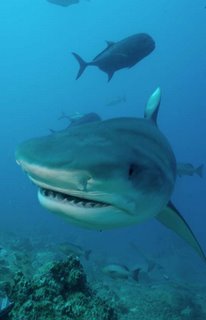Bula from the folks at BAD!
September has been and gone and what a month it was. BAD was privileged to play host to Juerg Brunschweiller and his research team, Gary & Brenda Adkison and Ron & Valerie Taylor. Last month also saw the return of some familiar faces, Mike & Jo and the arrival of some new faces, Matt & Klaus.
In 2004, Juerg used state of the art pop-up satellite tags on 11 mature female bull sharks to learn more about their annual migration routes. This year was all about localised movements; with the use of listening stations and radio transmitters, Juerg is hoping to uncover the secrets to the bulls? daily movement patterns within the waters of Beqa Lagoon. Mother nature did not make it easy for us.
Torrential rain caused the Qaraniqio River to burst it?s banks, canceling a couple of day?s diving and ultimately creating some sub-optimal visibility. However, after the 2 weeks all the listening stations were positioned and ?Granma?, one of the larger female bulls, is now the proud host to a radio transmitter.
Hopefully we shall get some interesting data from her movements during the time before she headed off on her annual mating/birthing migration.The bull sharks have now departed from Shark Reef Marine Reserve; this now means that we are having more sightings of Silvertips. With all 3 of our named individuals, Madonna, Lady & Joker, already regulars at the site and 3 unnamed individuals already witnessed, it looks to be a good summer in SRMR. Ratu Rua, the resident Queensland Grouper is a common fixture as is Hamilton the Napolean Wrasse.Prior to the freak rains, we were experiencing 20-30m viz out on our soft coral sites in Beqa Lagoon. Some interesting finds this month were Frogfish and Stonefish on Rusi?s Pinnacle and Hawksbill Turtles at Carpet Cove.
A big congratulations goes out to Seema, Claire and Alan on completing their PADI Open Water Diver Course, may you have many years of happy diving ahead of you.
Finally to all those who came diving with us, the team at BAD say Vinaka Vakalevu and we hope to see again soon.
Andrew and the crew
 You read correctly, the team at BAD are waiting with bated breath for the running of the bulls; not the 4-legged variety though.
You read correctly, the team at BAD are waiting with bated breath for the running of the bulls; not the 4-legged variety though.
_(000000000336).jpg)
 The species, also known as the great white shark, will be protected under The Wildlife Act meaning it will be illegal to hunt, kill or harm a white pointer shark within New Zealand’s Exclusive Economic Zone (EEZ – 200 nautical mile limit around NZ). It will also be illegal in New Zealand to possess or trade in any part of a white pointer shark.
The species, also known as the great white shark, will be protected under The Wildlife Act meaning it will be illegal to hunt, kill or harm a white pointer shark within New Zealand’s Exclusive Economic Zone (EEZ – 200 nautical mile limit around NZ). It will also be illegal in New Zealand to possess or trade in any part of a white pointer shark.

















